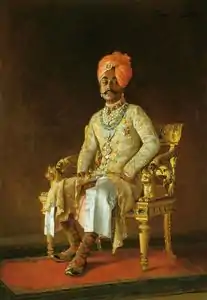Idar State Idar Rajya | |||||||
|---|---|---|---|---|---|---|---|
| c. 1257–1948 | |||||||
 Flag
 Coat of arms
| |||||||
| Capital | Idar | ||||||
| Government | Absolute monarchy | ||||||
| History | |||||||
• Established | c. 1257 | ||||||
• Rao rule of Idar | 1257-1656 | ||||||
• Marwar rule of Idar | 1729-1948 | ||||||
• Accession to the Dominion of India | 1948 | ||||||
| |||||||

Idar State, also known as Edar, was a princely state located in present-day Gujarat state of India. During the British era, it was a part of the Mahi Kantha Agency, within the Gujarat Division of Bombay Presidency.[1]
History
Rao Dynasty rule
Idar State was a princely state that was founded in 1257 by Rao Sonag. Its rulers of all time were Rathore Rajputs.[2][3] On the question of the succession of the state of Idar, the Sultan of Gujarat, Muzaffar Shah, and Rana Sanga of Mewar supported rival claimants. In 1520, Sanga established Raimal on the Idar throne, with Muzaffar Shah sending an army to install his ally Bharmal. Sanga himself arrived in Idar and the Sultan's army was beaten back. Rana pursued the Gujarati army and plundered the towns of Ahmadnagar and Visnagar of Gujarat, chasing the Sultan's army as far as Ahmedabad.[4] the Rathore's ruled Idar for 12 generations until they were defeated by the Mughals under Murad Baksh in 1656. Idar then became a part of the Mughal Province of Gujarat.
Marwar Dynasty takeover
In 1729, Anand Singh and Rai Singh, brothers of the Maharaja of Jodhpur, captured Idar by force. They captured the districts of Idar, Ahmednagar, Morasa, Baad, Harsol, Parantij and Vizapur. Five other districts were made tributaries of their new state. The state was soon annexed by the Marathas under Damaji Gaekwad in 1753 and Anand Singh was killed in battle. When Rai Singh got to know about his brother's death he gathered a force and once again captured Idar; he placed Anand Singh's son on the throne and became his guardian. After Rai Singh's death in 1766, the Marathas once again threatened Idar upon which Rao Seo Sinh, son of Anand Singh, agreed to hand over the districts of Parantij and Vizapur to the Peshwa and Morasa, Baad and Harsol to the Gaekwads.[5]
In 1875, Idar state had a revenue of £60,000 and paid a tribute of £3,034 to the Gaekwads of Baroda State. The population of the state in 1875 was 217,382. The rulers were Rathor Rajputs of the Joda family and were entitled to a gun salute of 15 guns.[6]
In 1924, Idar was made part of the Western India States Agency. It was transferred to the Rajputana Agency in the early 1940s. On 10 June 1948, Idar became part of the Indian Union. In 1949, it was dissolved and split between Sabar Kantha district and Mehsana district, which were at that point in Bombay State.[7] Both districts were included in Gujarat when it was formed in 1960.
List of rulers of Idar
References
- ↑ Chisholm, Hugh, ed. (1911). . Encyclopædia Britannica. Vol. 14 (11th ed.). Cambridge University Press. p. 279.
- ↑ Indian Princely Medals: A Record of the Orders, Decorations, and Medals by Tony McClenaghan, pg 179
- ↑ Dhananajaya Singh (1994). The House of Marwar. Lotus Collection, Roli Books. p. 13.
He was the head of the Rathore clan of Rajputs, a clan which besides Jodhpur had ruled over Bikaner, Kishengarh, Idar, Jhabhua, Sitamau, Sailana, Alirajpur and Ratlam, all States important enough to merit gun salutes in the British system of protocol. These nine Rathore States collectively brought to India territory not less than 60,000 square miles in area.
- ↑ Hooja, Rima (2006). A History of Rajasthan. Rupa Publication. pp. 450–451.
- ↑ he Imperial Gazetteer of India pg. 198
- ↑ The Imperial Gazetteer of India pg 196–198
- ↑ Columbia-Lippincott Gazetteer, p. 824
External links
 Media related to Idar State at Wikimedia Commons
Media related to Idar State at Wikimedia Commons